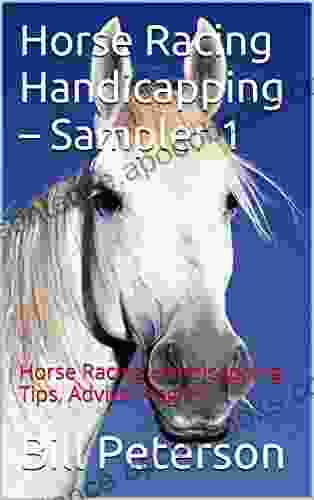Unlock the Secrets of Horse Racing Handicapping: A Comprehensive Guide

The world of horse racing is filled with excitement, strategy, and the thrill of victory. Whether you are a seasoned handicapper or a novice just starting out, understanding the intricacies of horse racing handicapping is key to maximizing your chances of success.
This comprehensive Horse Racing Handicapping Sampler is designed to provide you with a thorough overview of the fundamental principles, techniques, and strategies used by professional handicappers. By delving into the essential elements of handicapping, you will gain the knowledge and confidence to make informed bets and potentially increase your winnings.
What is Handicapping?
Horse Racing Handicapping – Sampler 1: Horse Racing Handicapping Tips, Advice, Angles (The Handicapper Series)by Dustin Hartley5 out of 5
Language : English File size : 621 KB Text-to-Speech : Enabled Screen Reader : Supported Enhanced typesetting : Enabled Word Wise : Enabled Print length : 25 pages Lending : Enabled X-Ray for textbooks : Enabled - The art of analyzing and evaluating racehorses to determine their potential for victory.
Importance of Handicapping:
- Enhances your chances of making profitable bets.
- Provides a more informed and engaging racing experience.
Key Factors to Consider:
- Pedigree and Bloodlines
- Jockey and trainer performance
- Class and distance
- Recent form and track conditions
The Role of Genetics:
- Pedigree analysis reveals the genetic makeup of a horse, which influences its physical attributes, athletic ability, and racing style.
Interpreting Pedigrees:
- Study the sire and dam lines to identify patterns and potential strengths and weaknesses.
- Consider the influence of influential bloodlines and prominent sires.
Case Studies:
- Analyze the pedigrees of successful racehorses to understand the correlation between genetics and performance.
The Importance of Jockey Quality:
- Jockeys' skills and experience can significantly impact a horse's performance.
- Consider their win-loss record, riding style, and ability to handle specific race conditions.
Evaluating Trainer Performance:
- Trainers are responsible for preparing and conditioning horses for races.
- Analyze their overall record, specialization, and ability to develop horses' potential.
Jockey and Trainer Combinations:
- Successful combinations of jockeys and trainers often result in improved racing outcomes.
Horse Class:
- The level of competition a horse faces, based on their past performances.
- Handicappers must consider the horse's abilities relative to the class of the race.
Race Distance:
- The length of the race can impact a horse's performance.
- Identify horses that have proven success at specific distances.
Case Studies:
- Examine the performance of horses in different classes and distances to understand the significance of these factors.
The Importance of Past Performances:
- Recent races provide valuable insights into a horse's current form and fitness.
- Analyze their running times, positions, and any relevant factors.
Track Conditions:
- Weather and track conditions can significantly influence a horse's performance.
- Consider the type of track surface, moisture level, and wind direction.
Adjusting for Track Bias:
- Some tracks exhibit bias towards certain running styles or post positions.
Manual Handicapping Methods:
- Time-tested techniques that involve evaluating data manually.
- Popular systems include Beyer Speed Figures and Brisnet Speed Ratings.
Software Tools:
- Computer programs designed to assist handicappers in analyzing data and identifying potential winners.
- Use software to automate calculations and access advanced statistical models.
Advantages and Disadvantages:
- Discuss the benefits and limitations of both manual and software-based handicapping approaches.
Win, Place, and Show Bets:
- Basic bets that offer different payouts based on the horse's finish position.
Exotic Bets:
- More complex bets that offer higher payouts but lower odds.
- Examples include trifectas, superfectas, and pick 3s.
Bankroll Management:
- Essential strategies for setting and managing your betting budget.
- Avoid chasing losses and bet within your means.
Experience and Intuition:
- The role of experience and instinct in making informed bets.
- Handicapping is both a science and an art.
Staying Informed:
- Keep up-to-date with racing news, track conditions, and horse performances.
- Use resources such as racing publications, websites, and forums.
Adaptability and Flexibility:
- Handicapping is a dynamic process that requires adaptability.
- Be prepared to adjust your strategies based on new information and changing conditions.
Horse Racing Handicapping Sampler has provided you with a comprehensive overview of the world of horse racing handicapping. By understanding the fundamental principles, techniques, and strategies outlined in this guide, you have taken a significant step towards becoming a more informed and successful handicapper.
Remember that handicapping is a multifaceted art that requires dedication, patience, and a willingness to learn. Continue to refine your skills, analyze data diligently, and stay abreast of industry trends. With perseverance and passion, you can unlock the secrets of horse racing handicapping and achieve greater success in your betting endeavors.
5 out of 5
| Language | : | English |
| File size | : | 621 KB |
| Text-to-Speech | : | Enabled |
| Screen Reader | : | Supported |
| Enhanced typesetting | : | Enabled |
| Word Wise | : | Enabled |
| Print length | : | 25 pages |
| Lending | : | Enabled |
| X-Ray for textbooks | : | Enabled |
Do you want to contribute by writing guest posts on this blog?
Please contact us and send us a resume of previous articles that you have written.
 Book
Book Novel
Novel Page
Page Chapter
Chapter Text
Text Story
Story Genre
Genre Reader
Reader Library
Library Paperback
Paperback E-book
E-book Magazine
Magazine Newspaper
Newspaper Paragraph
Paragraph Sentence
Sentence Bookmark
Bookmark Shelf
Shelf Glossary
Glossary Bibliography
Bibliography Foreword
Foreword Preface
Preface Synopsis
Synopsis Annotation
Annotation Footnote
Footnote Manuscript
Manuscript Scroll
Scroll Codex
Codex Tome
Tome Bestseller
Bestseller Classics
Classics Library card
Library card Narrative
Narrative Biography
Biography Autobiography
Autobiography Memoir
Memoir Reference
Reference Encyclopedia
Encyclopedia Emily Ribbons
Emily Ribbons W J Costello
W J Costello Jess Moss
Jess Moss Delores Fossen
Delores Fossen Rose Macaulay
Rose Macaulay Iny Lorentz
Iny Lorentz Emily Ruehs Navarro
Emily Ruehs Navarro Alfred Doblin
Alfred Doblin Karen Snyder
Karen Snyder Daurius Figueira
Daurius Figueira Ralph J Bunche
Ralph J Bunche Ali Adler
Ali Adler Roger Cruickshank
Roger Cruickshank George A Goens
George A Goens Elizabeth Hartman
Elizabeth Hartman Rob Harrell
Rob Harrell Elisabeth Gille
Elisabeth Gille Ella Cooper
Ella Cooper Lauren Landish
Lauren Landish Patrick M Jenlink
Patrick M Jenlink
Light bulbAdvertise smarter! Our strategic ad space ensures maximum exposure. Reserve your spot today!

 Federico García LorcaAegis: When Gods Clash - An Epic Fantasy Adventure That Will Leave You...
Federico García LorcaAegis: When Gods Clash - An Epic Fantasy Adventure That Will Leave You...
 Brian WestUnlock the Power of Standards-Based Reflective Practice: A Journey for Middle...
Brian WestUnlock the Power of Standards-Based Reflective Practice: A Journey for Middle... Grant HayesFollow ·3.8k
Grant HayesFollow ·3.8k Gerald ParkerFollow ·9.3k
Gerald ParkerFollow ·9.3k Bryce FosterFollow ·4.2k
Bryce FosterFollow ·4.2k Tyrone PowellFollow ·7.9k
Tyrone PowellFollow ·7.9k Timothy WardFollow ·7.9k
Timothy WardFollow ·7.9k Reginald CoxFollow ·17.1k
Reginald CoxFollow ·17.1k Robert HeinleinFollow ·19.6k
Robert HeinleinFollow ·19.6k George Bernard ShawFollow ·17k
George Bernard ShawFollow ·17k

 Julian Powell
Julian PowellShetland Pony: Comprehensive Coverage of All Aspects of...
The Shetland...

 Cason Cox
Cason CoxHow Anaesthetics Changed the World: A Medical Revolution...
Imagine a world where surgery is an...

 Harold Powell
Harold PowellUnleash Your Inner Songwriter: The Ultimate Guide for...
Calling all aspiring songwriters!...

 Nikolai Gogol
Nikolai GogolUnleash Your Artistic Potential: Quick Draw Anatomy for...
In the dynamic and visually...

 Tim Reed
Tim ReedThe Rock 'n' Roll Life of Legendary Sax Man Bobby Keys
The Rock 'n' Roll Life...

 Damon Hayes
Damon HayesMoney Management Activities for Youth: A Guide to...
In an era marked by rapidly...
5 out of 5
| Language | : | English |
| File size | : | 621 KB |
| Text-to-Speech | : | Enabled |
| Screen Reader | : | Supported |
| Enhanced typesetting | : | Enabled |
| Word Wise | : | Enabled |
| Print length | : | 25 pages |
| Lending | : | Enabled |
| X-Ray for textbooks | : | Enabled |








